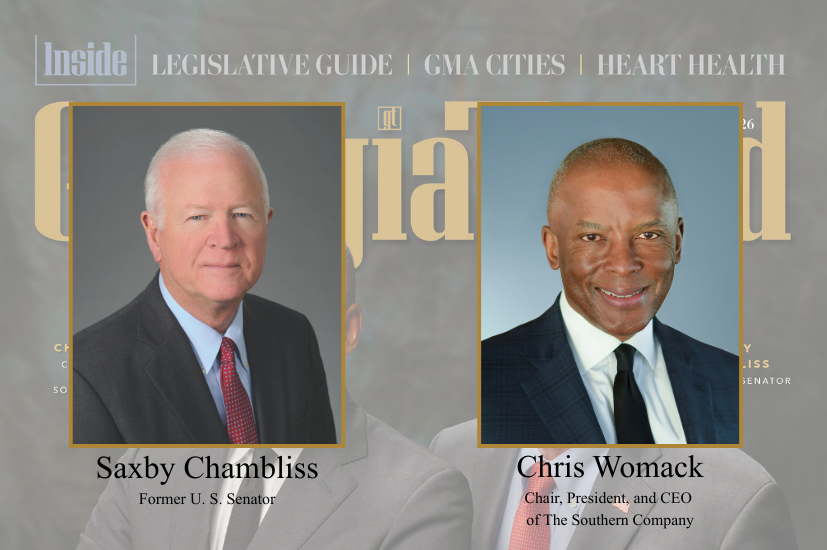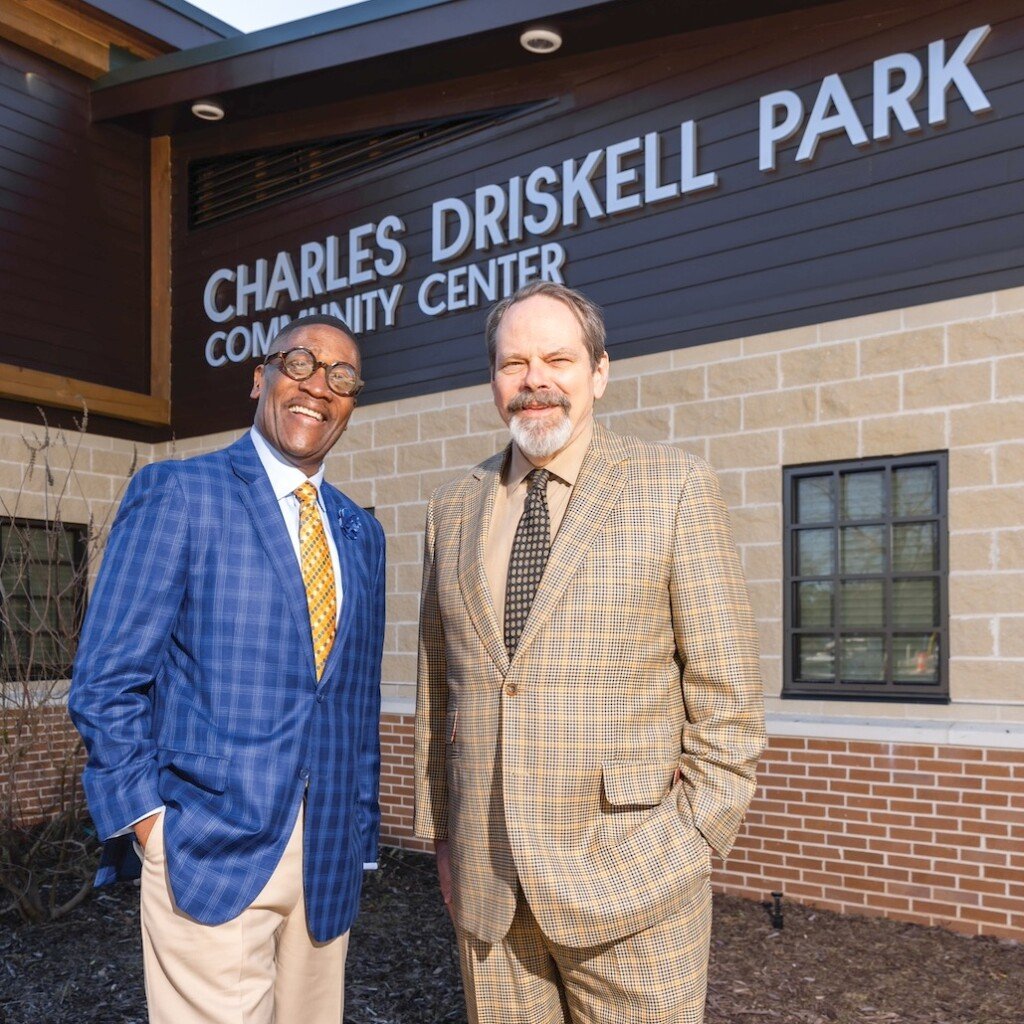The Atlanta Sound
The hip-hop scene is hotter than ever, thanks to industry pioneers in Atlanta.
Usher crushing it at the Super Bowl half-time show … Killer Mike handily racking up three Grammys in one night (to add to his other one) and assuming the mantle of eloquent, influential spokesman for his generation … The world’s first hip-hop museum, the Trap Music Museum, started by T.I. and named “one of the best musical landmarks in the Deep South” by National Geographic … Travel down any street in Atlanta, from Buckhead to Bankhead, and you likely will feel the throbbing bass in your sternum. Hip-hop has become, in the words of U.S. Sen. Raphael Warnock, the “soundtrack of our lives.”

Feeling Optimistic: Catherine Brewton, vice president of creative, BMI. | Photo credit: Wardell Mallory
And Atlanta, as they say, is representing.
Last summer, Complex magazine crowned Atlanta as the top hip-hop city in the world, over New York, Los Angeles, Miami, New Orleans, Chicago and London. Atlanta alone has an estimated 550 recording studios and counting. (Macon and Savannah have their own pulsating power centers.) Fulton County’s music industry grew by 110% from 2001 to 2018 – six times the growth rate of the county’s economy as a whole.
All of which is music to the ears of business leaders and creatives alike.
Welcome to Atlanta
No one yet has stats exclusively for hip-hop, but one pre-pandemic study shows the overall music industry supports 70,000+ jobs in Georgia with an economic impact of an estimated $5 billion.
The bottom lines of many restaurants, hotels, bars, retailers and small businesses depend on this industry. Musicians and their fans gather to pour the Red Drink, frequently mentioned in hip-hop songs and Juneteenth’s traditional beverage. (The other libation of choice in hip-hop songs is the oft-mentioned Hennessy.) Taken together, this ongoing party scene contributes to the regional quality of life, helping to attract and retain businesses and talent and fostering a sense of community.
“The true key to why Atlanta has become a hip-hop nexus is the homegrown talent and sense of belonging for newcomers,” says Aurielle Brooks, an entertainment attorney for Arrington & Phillips. A musician herself (violin, cello, piano), she interned at Def Jam Recordings before joining the law firm. She represents Sexyy Red, Kevin Gates, Tanerélle and sundry others in the hip-hopperati. “If a talented artist is on the rise in Atlanta, the hip-hop community, especially fans, stands behind that artist 100%. That is something that I think makes Atlanta so special and different from any other city where hip-hop lives – there is just more support here,” she says.
“Beyoncé opened the floodgates going country, so I foresee more blends in music. I see a coming-together of genres, influencing each other. And I feel good about it. This is the most optimistic I’ve felt about hip-hop in a couple of years.” Catherine Brewton, vice president of creative, BMI
Much comes down, of course, to the demography of the city known as the Black Mecca. Like the starry-eyed ax-slingers who stream into Nashville to busk on the sidewalks, rappers make the pilgrimage to Atlanta to hustle mixtapes out of car trunks.

Atlanta Pilgrimage: Rapper 4-IZE (Tony Hayes III) moved from Chicago to Atlanta. | Photo credit: contributed
“When you come from a place where you don’t see a positive reflection of yourself and then get off the plane or Greyhound in Atlanta, you see Black doctors, lawyers, businesspeople and politicians – people who look like me doing important things,” says Tony Hayes III, a journeyman rapper known as 4-IZE for his trademark spectacles. He trekked here from the Midwest. “It gives you a sense of optimism that makes you believe in yourself.”
4-IZE recently dropped an indie album, Ronald Reagan Sold Crack, at 529 Bar, presided over by DJ Kerosene. “I’m trying to get more topical and substantive in my lyrics,” he says, “which is getting back to the roots of this music.”
Hip-Hop’s Past and Future
Most artists, at the moment, are trying to get back to those roots. Hip-hop started around 50 years ago in the Bronx with rhythmic turntable scratching and borough-to-borough street battles of rhyme and wits. The word “hip-hop” is believed to have been coined by Keith (“Keef Cowboy”) Wiggins, a member of Grandmaster Flash and the Furious Five. He used the words hip/hop/hip/hop, imitating the sound of soldiers marching, in reference to a friend who had joined the military.

Representing Talent: Robert J. Finan, attorney, and Jeffrey M. Smith, attorney and principal shareholder, at Greenberg Taurig, LLP. | Photo credit: Ben Rollins
Hip-hop’s golden age in Atlanta was the 1990s. Here, ground zero was The Dungeon, the unprepossessing basement of the mother of record producer Rico Wade, widely revered as the architect of Atlanta hip-hop. Wade, who died April 13 of this year, was part of the production/songwriting team Organized Noize, which forged the icons OutKast, TLC and Goodie Mob (with CeeLo Green), among others. The players behind the scenes were at LaFace Records, the revolutionary record label led by hitmaking duo Antonio “L.A.” Reid and singer/songwriter Kenneth “Babyface” Edmonds.
Rappers were so dedicated to their craft, they slept much like campers on the floor of The Dungeon. Wade reputedly could act as a drill instructor and took a lesson from the playbook of Greek orator Demosthenes, who, according to legend, practiced talking with pebbles in his mouth to strengthen his speech. While Wade didn’t make his artists gargle rocks, he did have them run laps while chanting their lyrics to build up lung capacity.
In the ’90s, the East and West coasts were beefing, due to the infamous rivalry between The Notorious B.I.G. (Christopher Wallace) and Tupac Shakur that led to their murders. So most events during that time had a tense, hair-trigger vibe. At the 1995 Source Awards, OutKast won Best New Rap Group, and André 3000 declared to a hostile audience: “The South got something to say.” It was both a cri de coeur and a gauntlet. The message: Come to Atlanta where it’s friendlier and drop beats, not bodies. It was a funky, brand-new twist on the old “the city too busy to hate” chestnut. And come they did. As impresario (and So So Def Recordings label founder) Jermaine Dupri wrote and sang, “Welcome to Atlanta where the players play.”
One of the artists sofa-surfing at The Dungeon was Wade’s cousin Nayvadius DeMun Cash (né Wilburn). “I was soaking up the game,” he has said in interviews. He’s better known as Future, one of today’s most popular rappers, and is currently gearing up for a tour that is one of hip-hop’s most anticipated events.

Making an Impact: Four-time Grammy winner Killer Mike, above, exhibits at the Trap Museum, known as the world’s first hip-hop museum. | Photo credit: Christopher Leckie
“Future started in Atlanta but has become an international star who is as comfortable on the Milan fashion runway with Naomi Campbell as he is writing, producing and rapping in what is literally a unique style,” says Jeffrey Smith, an attorney and member of Future’s team who also represents Aerosmith, Jimmy Buffett’s trust, Def Leppard, the estate of Michael Jackson and Margaritaville.
The Main Street
On a recent spring day, in the offices of law firm Greenberg Traurig, Smith and two other insiders reflected on the current scene. Attorney Rob Finan, who handles the many-splendored affairs of Ludacris, swaps stories with Catherine Brewton, who founded the Atlanta chapter of the Grammys and is now vice president of creative at BMI.
Brewton, who is wearing a large pendant that reads PEACE, is talking about the future. “Beyoncé opened the floodgates going country,” she says of the star’s Cowboy Carter album, “so I foresee more blends in music. I see a coming-together of genres, influencing each other. And I feel good about it. This is the most optimistic I’ve felt about hip-hop in a couple of years.”
Adds Finan, “Yes, music is no longer segregated in these silos, and I think music in general is stronger for it.”

Big Boi in the original Dungeon, in the house of producer Rico Wade’s mother. | Photo credit: Cam Kirk/Courtesy of Airbnb Community
Smith says, “The current moment we’re in reminds me of that time in the 1950s when it was so evident that blues, country and rock were all just kissing cousins.”
Plus, hip-hop just grows increasingly mainstream. The street, as it were, is now Main Street.
“Ludacris is the spokesman for State Farm Insurance,” says Smith. “How much more Middle American can you get?”

All Talent Welcome: Aurielle Brooks, entertainment attorney for Arrington & Phillips who represents a number of hip-hop musicians. | Photo credit: contributed
The three also cite nostalgia as a trending factor. More artists are looking back reverently to their elders. Georgia’s James Brown still reigns as the most sampled artist in hip-hop, and Future wants to sample Barry White in an upcoming project. “Expect a resurgence of interest in Barry White soon,” says Smith, arching an eyebrow.
The South, it seems, still has a lot to say.







